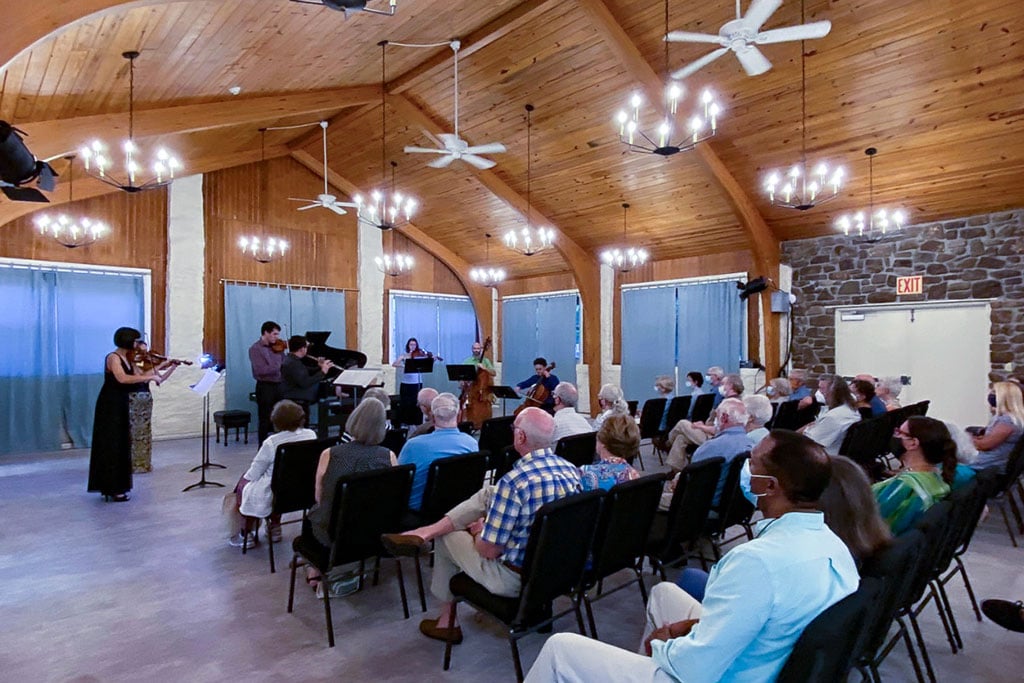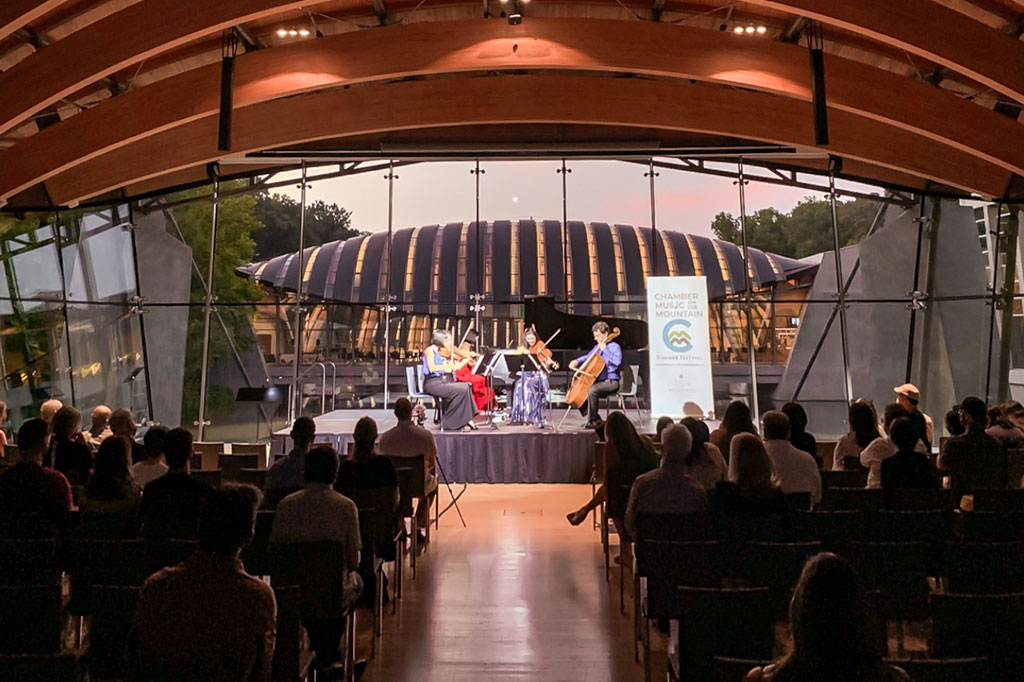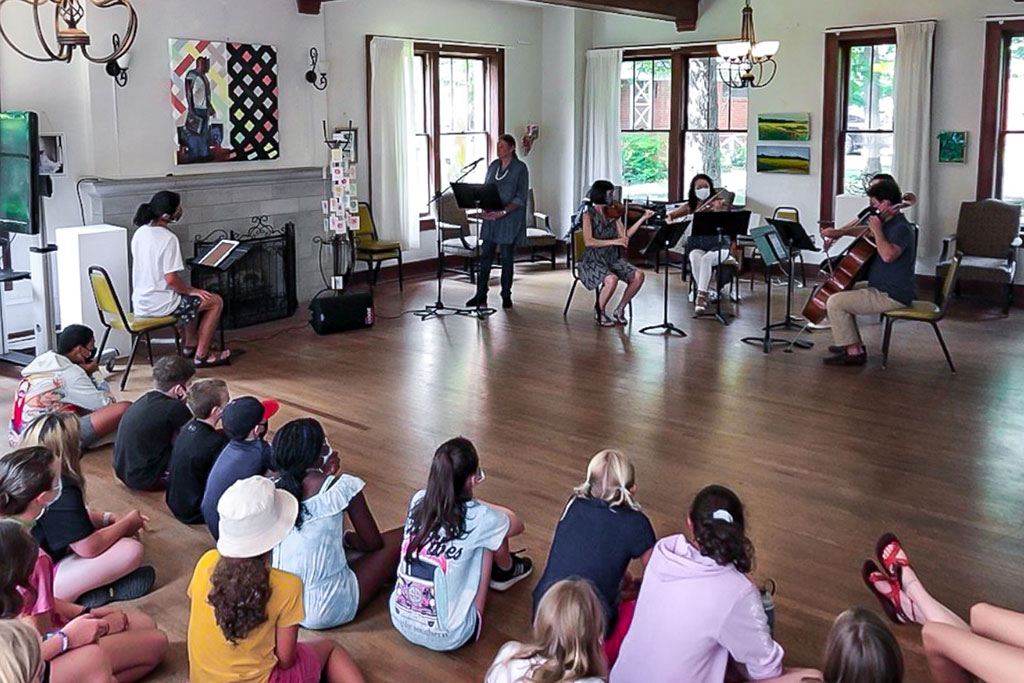 Chamber Music on the Mountain (Jessica DeBari)
Chamber Music on the Mountain (Jessica DeBari)Chamber music is a form of classical music written for and performed by a small ensemble with one player on each part. University of Arkansas piano professor and pianist for the Symphony of Northwest Arkansas, Tomoko Kashiwagi, launched the two-week summer festival, Chamber Music on the Mountain, in 2021 as a part of the Creative Spaces NWA at Mount Sequoyah Center in Fayetteville. The festival has been making classical music more accessible for the NWA community through various community engagement events, performances in casual, friendly venues, and free or affordably priced tickets.
This year, Chamber Music on the Mountain is celebrating Mount Sequoyah Center’s 100th year of programming with 11 events from July 17-29, centered around the theme, Past, Present, and Future. The concerts take place in various venues throughout the region, including the Fayetteville Public Library, the Botanical Garden of the Ozarks, the Medium, Ozark Mountain Smokehouse, and Mount Sequoyah Center. You’ll hear music by familiar composers such as Bach, Faure, and Dvorak, but you’ll also hear some fresh compositions of diverse styles from around the world as well as music by Arkansas composers.
Kashiwagi talked to Amos Cochran, Emmy-nominated composer from Van Buren, who will be presenting “Sonic Dreamscapes with Amos Cochran and Quartet” on Friday, July 28, at 6:30 p.m. at Mount Sequoyah Center’s Millar Lodge as a part of the CMM festival.
Kashiwagi: I am so excited to feature your music as part of our festival this year because I think you bring a different perspective to chamber music. Can you describe your musical style to our readers?
Cochran: Hey! I’m thrilled to be a part of this year’s festival. I have never thought of my music as anything specific. I believe the concepts are actually more rooted in electronic, ambient, and jazz but presenting those ideas with instrumentation we traditionally associate as “chamber” or “classical” it makes for a unique sonic experience. My music is generally more emotion over technique. I honestly don’t even think of myself as a piano player, I just know how to play my music. Most of the string arrangements are whole and half notes that become more about the way the players approach blending the soundscapes than anything traditionally thought of as fancy. I also find virtuosity in really simple and quiet ideas being executed to perfection as much as some wild violin solo. I always have an electronic element that mixes in with the strings and piano to create something sonically different for the audience that may initially seem out of place but in the end, these instruments and electronics are just creating sound. This year I have used “Ambient Classical Music” as a description that feels best at the moment.
Kashiwagi: One of the things that I love about chamber music is that we see our audience and we really get to connect. What’s your secret to engaging your audience?
Cochran: I have a very relaxed interaction with the audience. I have always felt rigidness at traditional chamber / classical concerts. I try to break down any walls between myself, the players, and the audience. The music is taken very seriously, but between songs, I try to create a very relaxed and funny atmosphere. I take the music very seriously but I don’t take myself seriously at all. In the past, this has all turned into a different type of experience for the audience member who is used to a traditional show. I do love how close the audience is at chamber shows. I’m hoping to really lean into this with our performance on the 28th and having the audience seated in the round instead of the typical divide created by a stage area.
Kashiwagi: You collaborate with such a diverse group of musicians. When you work with classically trained musicians, is there anything you notice that’s unique?
Cochran: This is true. I have worked with a pretty wide range of creatives. My roots are playing bass in the jam band scene where we practice in the basement for days to get the music right. I also can’t read music well at all! I’m always in awe of how classically trained musicians can play things perfectly the first time. There are also elements of my music that have moments where I’m asking the musicians to “respond” to a set of instructions. I always love seeing how these moments come across. Most of the time in chamber and orchestral settings the musicians aren’t being asked to have much agency in the music. I love giving them this freedom. It’s always a little different each time which keeps everyone on their toes. I’m also quite interested in how the bow works on the string. You can put a whole note on the page, but the pressure with which the players choose to use defines the sound.
 Chamber Music on the Mountain (Courtesy)
Chamber Music on the Mountain (Courtesy)Kashiwagi: I try to make sure that the music at every concert is varied and interesting. I want to make these concerts a good experience for everyone, both the audience and the performers. What do you consider when you’re putting together your show?
Cochran: I have learned over the years that groupings of my songs work well together. There are some tunes that can’t be at the end of the show and vice versa. I tend to always start and end with two specific pieces. Generally, my music is shorter than traditional classical music and I can craft the set without worrying too much about what the audience thinks if they aren’t a fan of the current tune we are playing, it’s ok because, in a few minutes, it will be something different. There is an overall emotional arch that I’m searching for with each performance. My ideal show is a little longer than the one on the 28th and I had to make some adjustments, which is a neat challenge and I’m excited to see how it plays out.
Kashiwagi: There’s one special concert this year that I’m extremely proud of. It’s the Apple Blossom concert on Thursday, July 27th, at 6:30 pm at the Medium. It’s a concert that features seven living Arkansas composers, including you. As classical musicians, we have such an abundance of repertoire written over the centuries and we often dwell and indulge in the traditional repertoire. Can you share your views about the importance of newly composed music?
Cochran: I do come from such a different background. I have been fortunate enough to always play music that a friend wrote or that I wrote. I have a few covers I play but all of those are living pop musicians. So I will speak from the view of the “living composer” – for me writing music is more about audiolizing an idea or concept. Most of this music of mine is more personal therapy than anything else. I also write a lot of music for films. These are generally inspired by someone else’s story and my abstract way of supporting that story. One of the things I’d like to see in classical music is orchestras getting away from the traditional repertoire. There is nothing wrong with it but I feel like it has the potential to perpetuate a “this is the way it is” kind of mindset which can be very non-inclusive. New music (ideas) often feels more inviting because they aren’t as understood. By playing a new piece of music for an audience I’m asking them to join in the conversation about what the piece is- how I play it, how the audience reacts, and how I then decide to play it next time based on these things. New music feels very wide open in an emotional sense. Not as many people have experienced it and its potential to have an enlightening impact on someone feels more possible.
 Chamber Music on the Mountain (Courtesy)
Chamber Music on the Mountain (Courtesy)Kashiwagi: Lastly, what do you hope your audience to feel at the end of your show?
Cochran: I have absolutely no intentions when it comes to how I want someone else to feel after a show. Making sure I feel as close to the idea of the music as possible while performing is what I’m after. Music and sound have the ability to manipulate our perception of time. My only hope is that the audience experiences that time in the way they feel makes sense for them. I used to have this concept – “by the end of the third whole note we should be crying and by the end of the fourth whole note everything should feel ok again.” While I like the initial thought behind this concept, now I feel that it is a little too emotionally specific. My job is more of a guide through our time together. We may end up a little far out and I hope the audience trusts me enough to know I will bring them back (and I always do) but how they feel once we make it back is really out of my hands. Thanks again for having me. It’s going to be a neat performance!
Chamber Music on the Mountain starts July 17 and the final concert is July 29. For more details about the events and artists, visit www.chambermusiconthemountain.org.

